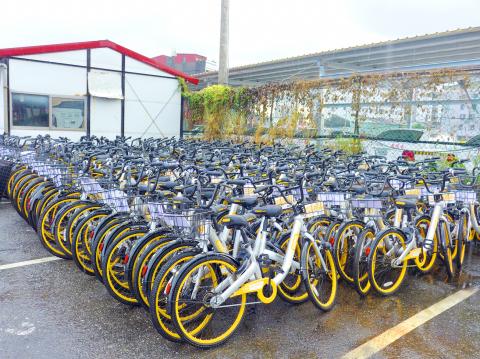Stationless bike-sharing platform oBike has said it might appeal the New Taipei City Department of Transportation’s ban on parking oBikes in public parking spaces in 11 densely populated districts.
The ban follows complaints against oBike — a Singapore-based company that began operating in Taiwan in April — that their bikes often occupy public parking spaces for motorcycles or are parked in ways that obstruct pedestrians.
The bicycle sharing service has a “rent anywhere, return anywhere” policy that allows users to leave the bicycles where they want.

Photo: Lee Ya-wen, Taipei Times
As a result of the ban, 969 of the company’s bikes had been towed as of Sunday, mostly from the city’s Tamsui (淡水), Luzhou (蘆洲), Sanchong (三重), Yonghe (永和), Jhonghe (中和), Banciao (板橋), Tucheng (土城), Sinjhuang (新莊), Sindian (新店), Linkou (林口) and Sijhih (汐止) districts.
OBike Taiwan general manager Wang Yan-ting (王妍婷) said the company promotes environmentally friendly transportation and does not accept government funding.
Under existing laws, the bikes can be parked in parking spaces, she said, adding that criticizing the company for occupying parking areas is wrong.
Wang questioned the legality of the city government’s ban and said she would consult with lawyers to decide if the company would file an administrative appeal with the Executive Yuan, the Liberty Times (sister paper of the Taipei Times) reported on Sunday.
The company is unlikely to reclaim the towed bikes for the time being, she said.
New Taipei Mayor Eric Chu (朱立倫) yesterday said that the city might establish parking rules for the bikes and other forms of “green” transportation.
The transportation department said the areas selected for the ban are densely populated and motorcycle and bike parking spaces are at a premium. For-profit rental bike companies are no longer permitted to occupy public parking spaces in these areas, it said, but added that it might add more bicycle parking to encourage “green” transportation.

TAKING STOCK: A Taiwanese cookware firm in Vietnam urged customers to assess inventory or place orders early so shipments can reach the US while tariffs are paused Taiwanese businesses in Vietnam are exploring alternatives after the White House imposed a 46 percent import duty on Vietnamese goods, following US President Donald Trump’s announcement of “reciprocal” tariffs on the US’ trading partners. Lo Shih-liang (羅世良), chairman of Brico Industry Co (裕茂工業), a Taiwanese company that manufactures cast iron cookware and stove components in Vietnam, said that more than 40 percent of his business was tied to the US market, describing the constant US policy shifts as an emotional roller coaster. “I work during the day and stay up all night watching the news. I’ve been following US news until 3am

UNCERTAINTY: Innolux activated a stringent supply chain management mechanism, as it did during the COVID-19 pandemic, to ensure optimal inventory levels for customers Flat-panel display makers AUO Corp (友達) and Innolux Corp (群創) yesterday said that about 12 to 20 percent of their display business is at risk of potential US tariffs and that they would relocate production or shipment destinations to mitigate the levies’ effects. US tariffs would have a direct impact of US$200 million on AUO’s revenue, company chairman Paul Peng (彭雙浪) told reporters on the sidelines of the Touch Taiwan trade show in Taipei yesterday. That would make up about 12 percent of the company’s overall revenue. To cope with the tariff uncertainty, AUO plans to allocate its production to manufacturing facilities in

Six years ago, LVMH’s billionaire CEO Bernard Arnault and US President Donald Trump cut the blue ribbon on a factory in rural Texas that would make designer handbags for Louis Vuitton, one of the world’s best-known luxury brands. However, since the high-profile opening, the factory has faced a host of problems limiting production, 11 former Louis Vuitton employees said. The site has consistently ranked among the worst-performing for Louis Vuitton globally, “significantly” underperforming other facilities, said three former Louis Vuitton workers and a senior industry source, who cited internal rankings shared with staff. The plant’s problems — which have not

TARIFF CONCERNS: The chipmaker cited global uncertainty from US tariffs and a weakening economic outlook, but said its Singapore expansion remains on track Vanguard International Semiconductor Corp (世界先進), a foundry service provider specializing in producing power management and display driver chips, yesterday withdrew its full-year revenue projection of moderate growth for this year, as escalating US tariff tensions raised uncertainty and concern about a potential economic recession. The Hsinchu-based chipmaker in February said revenues this year would grow mildly from last year based on improving supply chain inventory levels and market demand. At the time, it also anticipated gradual quarter revenue growth. However, the US’ sweeping tariff policy has upended the industry’s supply chains and weakened economic prospects for the world economy, it said. “Now